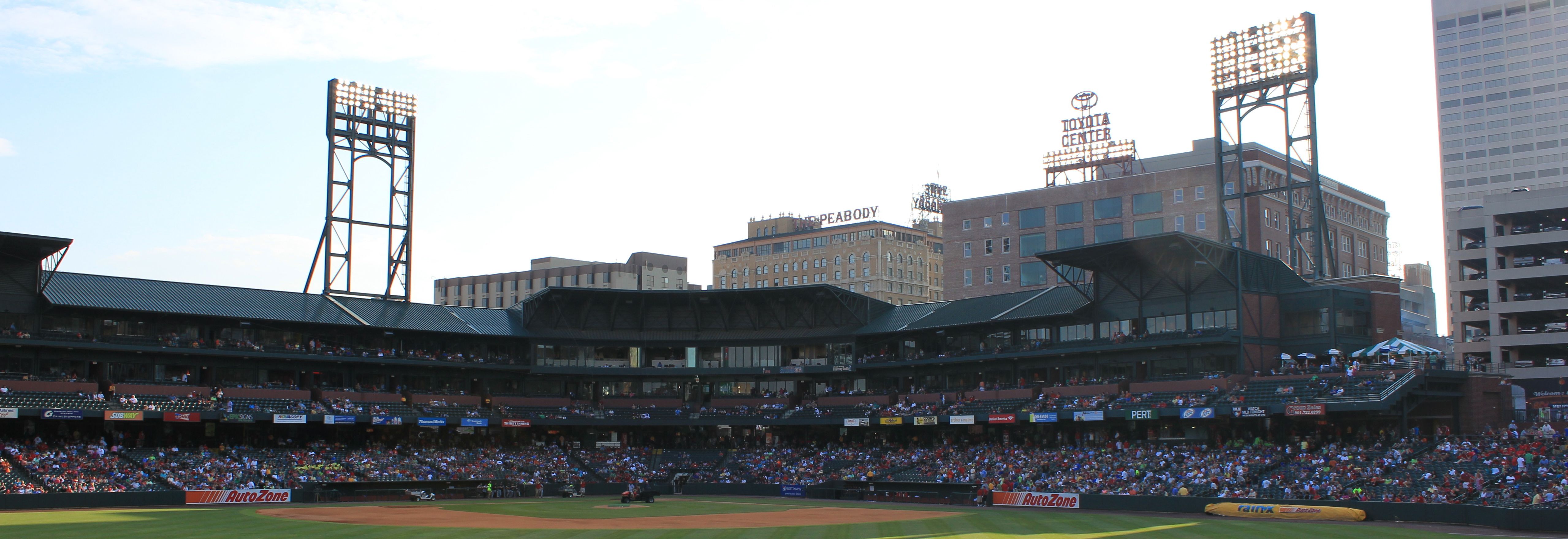BY CAROLYN LAWELL
MEMPHIS, Tennessee | The light towers at AutoZone Park rise 130 feet above the field, each one stacked with so many bulbs that if a quarter of them burned out, the system would still meet Minor League Baseball standards. This isn’t surprising. Nearly everything about AutoZone Park – its courtyard entrance, its 48 suites, its record-setting video board, even its lights – make it feel more like a Major League stadium than a minor league park.
It took $80.5 million of mostly private funding to open the park for the Redbirds in 2000. It’s still the most expensive minor league park by tens of millions of dollars. Its ability to revitalize a downtown area has helped make it the talk of numerous other minor league teams and cities, all hoping to create a similar vision, for the last dozen years.
“Downtown Memphis really wasn’t all that it should be, and since we built the ballpark here, downtown has changed tremendously,” says Mark Anderson, the team’s director of operations. “There are a lot more people that come down here and live down here.”
STADIUM STATS
Looney Ricks Kiss, which has offices located in the same building as the Redbirds front office, was the lead architectural firm for AutoZone Park, with Populous as a consultant. The stadium has undergone a handful of renovations over the last dozen years, including the removal of seats to add a party deck and the addition of stairs to give easier concourse traffic flow. Even before those revisions, though, the original contents that went into the park were staggering:- 125,738 square feet of brick wall surrounding the park
- 100,000 square feet of sod covering the outfield
- 17,586 cubic yards of concrete – enough to cover 11 acres
- 3,400 tons of structural steel
- 277 miles of electrical wiring
Anderson knows every inch of the ballpark – the Redbirds are the only team he has worked for during his rise from ticket office intern to the upper echelon of the front office. He knows stats and facts like the height of the light towers, which are part of the park’s retro style, and he knows how difficult it is to maintain a high standard for daily cleanliness and annual upkeep. His favorite part of working for the Redbirds and overseeing the ballpark, though, has nothing to do with the facility.
“My favorite part,” he says, “is what it has done for the city of Memphis itself.”
AutoZone Park is nestled on 14 acres between skyscrapers, The Peabody Hotel and residential buildings. It replaced spots once condemned and sparked more than $80 million in downtown development projects. The turnaround is reflected in a mural on the side of a parking garage near the park, a diverse group of city residents painted in vibrant colors.
“I remember looking at it and saying, ‘There’s no way that’s a minor league ballpark,’” says Ben Weiss, now in his third full season as the team’s general manager.
Weiss first saw the park when he was visiting his brother in Memphis. Weiss has worked for Comcast-Spectator/Global Spectrum since 2001, selling tickets and overseeing operations for everything from women’s professional soccer, concerts, the circus, the NBA and minor league hockey. He never expected a career in minor league baseball.
Then the Memphis Redbirds Baseball Foundation hired Global Spectrum in 2009 to run AutoZone Park to help turn around some growing pains. Attendance has dropped from a peak of 887,976 in 2001 to 493,528 last season – and that represented the first increase in annual attendance in a decade. The foundation defaulted on a bond payment in 2009 and even explored the possibility of selling the team in the last eight months.
Weiss accepted the job understanding all of the challenges. “We’re on the up tick,” he says. “The ship has not necessarily been fully righted, but we have it going in the right direction.”
No matter the size of the ballpark, its price tag or its location, teams usually achieve success the same way.
“The goal at the end of the day is to sell more tickets,” Weiss says. “If we sell more tickets, that has the full trickle down to advertising sales, concession sales, merchandising sales. All of those things are driven solely by getting people to the ballpark and selling tickets.”
Carolyn@AMinorLeagueSeason.com ♦ @CarolynLaWell ♦ @AMinorLgSeason
Want to read stories about the other teams on our schedule? Click here and scroll to the calendar.
